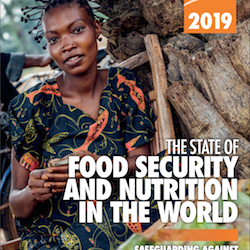
The Food and Agriculture Organization (FAO), together with the International Fund for Agricultural Development (IFAD), United Nations International Children’s Emergency Fund (UNICEF), World Food Programme (WFP), and World Health Organization (WHO), recently released The State of Food Security and Nutrition in the World Report 2019 (SOFI 2019).
The report tracks the world’s progress towards attaining the Sustainable Development Goal (SDG) of zero hunger by (1) ending hunger and ensuring access to food by all and (2) eliminating all forms of malnutrition. In particular, it looks into the prevalence of undernourishment (PoU) and the prevalence of moderate or severe food insecurity based on the Food Insecurity Experience Scale (FIES) to track world hunger. The prevalence of undernourishment is “an estimate of the proportion of the population whose habitual food consumption is insufficient to provide the dietary energy levels that are required to maintain a normal active and healthy life” (FAO, n.d.). On the other hand, an addition to this year’s report is the prevalence of moderate or severe food insecurity based on the FIES, which determines people’s adequate access to food. The inclusion of the latter signals the recognition that “food insecurity is more than hunger.” Apart from eradicating hunger, the goal of zero hunger also means ensuring access to safe, nutritious and sufficient food all year round and eradicating all forms of malnutrition.
This year’s report presents the following findings:
- After a decade of steady decline, the number of people suffering from hunger in the world has slowly increased for several years in a row, underscoring the immense challenge of ending hunger by 2030.
- Childhood stunting is decreasing too slowly and anaemia in women persists; but overweight and obesity are actually rising in most countries, calling attention to the need for greater efforts to halt and reverse this growing epidemic.
- Economic slowdowns and downturns pose challenges for food security and nutrition; creating sustained escapes requires safeguarding against these and tackling increasing inequalities.
For more information on the report, please visit the FAO site.

